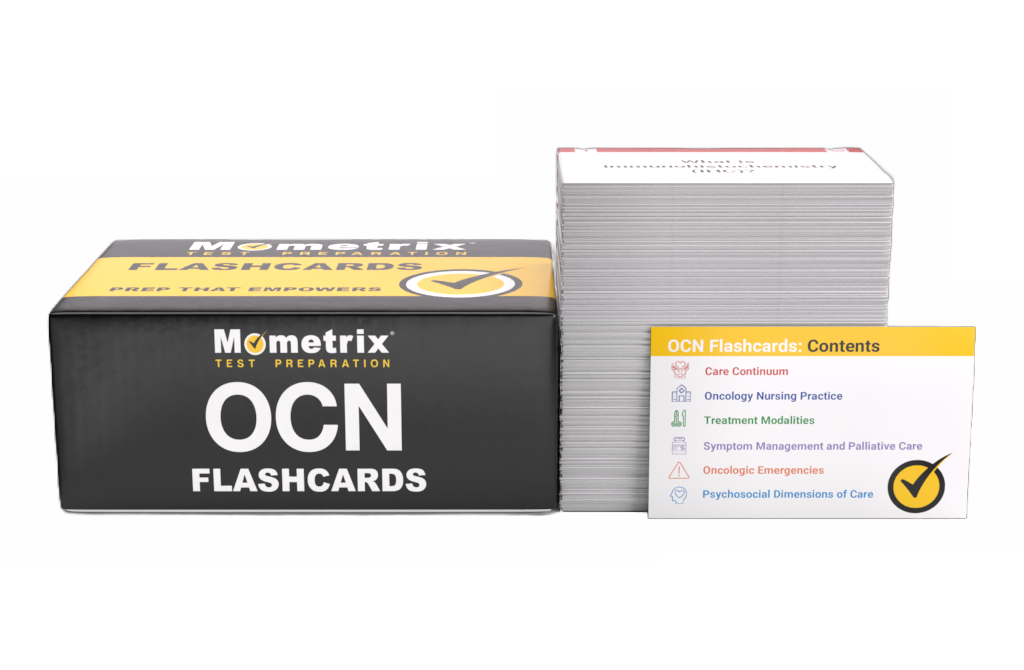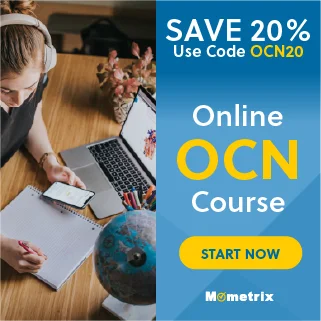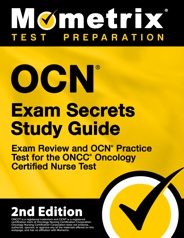The Oncology Nursing Certification Corporation (ONCC®) Oncology Certified Nurse (OCN) exam was designed for registered nurses seeking to demonstrate their understanding of current knowledge and practice in oncology nursing and feel the personal accomplishment of earning OCN certification. The OCN exam tests your advanced knowledge and skills related to oncology nursing beyond the minimum knowledge and skills necessary to become an RN.
What is OCN certification?
While RN licensure demonstrates the requisite entry-level knowledge to begin working in the field, it does not necessarily demonstrate to your employers or patients your dedication to continuing your education and broadening your knowledge and skills. The OCN certification process is voluntary and provides your employers and patients with the assurance that you are dedicated to obtaining and maintaining specialty knowledge in oncology nursing.
OCN certification also provides comfort to your patients and rewards to you as an RN. Certification, while voluntary, may be necessary for advancement into higher-level roles in your organization and can help open additional professional opportunities, including potential income increases.
Oncology Nurse Certification Eligibility
In order to take the OCN exam, you must hold an active, current, unencumbered RN license in a state or territory of the United States or Canada. Potential test-takers must also demonstrate at least one year (12 months) of practice and experience as a licensed RN, occurring within 3 years of completing the application for the exam.
Additionally, you need to have completed at least 1,000 hours of adult oncology practice in nursing within 2.5 years prior to application. This practice needs to have been completed as a licensed RN and can be clinical, educational, administrative, or in a research capacity.
Lastly, you need to have completed at least 10 hours of continuing nursing education in an oncology-related area within the previous 3 years.
Check Out Mometrix's OCN Flashcards
Get complex subjects broken down into easily understandable concepts
Get Your Flashcards
OCN Exam Outline
There are 165 multiple-choice questions on the OCN exam, divided into six content areas, each weighted differently. Of the 165 questions, only 145 items count toward your score, because 20 are pretest questions designed to aid the test creators in determining what should be included in the exam.
The content and structure of the exam will appear as follows:
I. Care Continuum (19%)
The 31 questions in this section will cover the following topics:
- Health promotion
- Disease prevention
- Screening and early detection
- Coordination of care
- Navigation of care
- Advance care planning
- Epidemiology
- Survivorship
- Considerations related to treatment
- End-of-life care
II. Oncology Nursing Practice (17%)
The 28 questions in this section will cover the following topics:
- Scientific bases
- Considerations of site-specific cancer
- Standards and scope of practice
III. Treatment Modalities (19%)
The 31 questions in this section will cover the following topics:
- Surgical interventions
- Procedural interventions
- Blood and marrow transplants
- Radiation therapy
- Chemotherapy and biotherapy
- Immunotherapy
- Vascular access devices for treatment administration
- Targeted therapies
IV. Symptom Management and Palliative Care (21%)
The 35 questions in this section will cover the following topics:
- Etiology of symptoms
- Anatomical alterations
- Surgical alterations
- Pharmacologic interventions
- Complementary and integrative modalities
- Palliative care considerations
- Function alterations
- Pain management
V. Oncologic Emergencies (12%)
The 20 questions in this section will cover the following topics:
- Disseminated intravascular coagulation (DIC)
- Syndrome of inappropriate antidiuretic hormone secretion (SIADH)
- Sepsis
- Tumor lysis syndrome
- Hypersensitivity
- Anaphylaxis
- Hypercalcemia
- Cardiac tamponade
- Spinal cord compression
- Superior vena cava syndrome
- Increased intracranial pressure
- Obstructions
- Pneumonitis
- Extravasations
- Adverse events related to the immune system
- Venous thromboembolism
VI. Psychosocial Dimensions of Care (12%)
The 20 questions in this section will cover the following topics:
- Cultural, spiritual, and religious diversity
- Financial concerns
- Altered body image
- Learning preferences
- Learning barriers
- Social relationships
- Family dynamics
- Coping mechanisms and skills
- Support
- Psychosocial distress
- Sexuality
Top 5 Most Challenging OCN Questions
Now that you know more about the exam, try your hand at some targeted practice!
Over the last year, we’ve compiled the data from about 2,000 test-takers who tried their hand at the practice test at the top of this page. According to the data, around 75% of people answered these five questions incorrectly.
Answer each question and read through the answer explanation, whether you got the answer right or wrong. This will help you ensure you’ve got the topic mastered.
Whether you struggled with these questions or aced them on your first try, be sure to take the full practice test to get a better idea of how prepared you really are!
1. Which of the following occurs during the initiation stage of carcinogenesis?
- Initiation: Carcinogens cause genetic alterations in DNA, but these are usually reversed through DNA repair mechanisms, although some mutated cells may persist. However, these few cells are not usually cause for concern during the initiation stage.
- Promotion: Repeated exposure to carcinogens results in genetic mutations that persist. Suppressor genes, which prevent unnecessary cell growth, are impaired, allowing mutated cells to reproduce. Impairment of other genes prevents the death of mutated cells with damaged DNA.
- Progression: Cells exhibit increasing malignant behavior and may invade adjacent tissues.
2. You are administering blood to a patient in the infusion center. Your patient begins to experience a headache, nausea, and chills. The patient has had numerous blood transfusions in the past. Which type of infusion reaction is the patient most likely experiencing?
3. For hypercalcemia of malignancy, the medication that is indicated to increase the excretion of calcium is:
4. What percentage of both adrenal glands are nonfunctioning before symptoms of adrenal failure become evident?
5. A patient who underwent gastrojejunostomy for cancer of the stomach complains that he is having abdominal cramps, palpitations, nausea, and vomiting shortly after eating. The nurse anticipates that the patient needs:
Registration
To sign up for the OCN exam, you will need to submit your application online. Within four weeks of submitting your application to test, you will receive an Authorization to Test, assuming you are determined eligible. You will then receive a test eligibility period for you to schedule and take the test.
Fees
The full cost of the OCN exam is $420. However, if you are a member of ONS/APHON, you will receive a discount, reducing the cost of the exam to $300.

OCN Online Prep Course
If you want to be fully prepared, Mometrix offers an online OCN prep course designed to give you everything you need to succeed!
Here’s what you’ll find in the OCN course:
- 80 Review Lessons Covering Every Topic
- Over 1,150 OCN Practice Questions
- 20+ Video Tutorials
- 550+ Digital Flashcards
- Money-back Guarantee
- Mobile Access
Everyone learns differently, so we’ve tailored the OCN online prep course to ensure every learner has what they need to prepare for the OCN exam.
Click below to check it out!
OCN Study Guide
Having a thorough understanding of the content and structure of the OCN exam is the first step toward earning your OCN certification. Getting enough sleep before the exam and taking care of yourself physically will aid in your success on exam day. However, the most effective means of ensuring you perform well on the OCN exam is to prepare using the best test preparation materials you can find. This is where Mometrix steps in.
Mometrix Test Preparation offers a comprehensive OCN exam study guide: OCN Secrets. In this guide, you get actual OCN exam questions that help you recall the material you already know and achieve the score necessary to earn your certification. The OCN Secrets study guide was written by Mometrix Test Preparation’s standardized test researchers, who have discovered the secrets of the OCN exam and are able to impart to you the most effective methods to reduce your stress, pass the exam, and become an OCN.
In addition to the OCN Secrets study guide, Mometrix also provides you with the OCN Exam Flashcard Study System, which includes additional comprehensive OCN Exam Practice Test questions. Earn the best score you can earn on the OCN exam by thoroughly preparing, studying, and testing yourself with real OCN exam content. Read the OCN Secrets study guide, test your knowledge with the OCN Exam Flashcard Study System and Practice Test, and get the score you need to pass the OCN exam and become an OCN. You have the knowledge and skills; now you need the certification.
Check Out Mometrix's OCN Study Guide
Get practice questions, video tutorials, and detailed study lessons
Get Your Study Guide
FAQs
Q
How many questions are on the exam?
A
There are 165 questions on the OCN exam.
Q
How long do you have to take the exam?
A
You will be given three hours to complete the OCN exam.
Q
How much does it cost to take the Oncology Certified Nurse exam?
A
The cost to take the OCN exam is $300 for ONS/APHON members and $420 for non-members.
Q
What is the pass rate for the OCN?
A
The pass rate for the OCN ranges between 70% and 80%.
Q
What is a passing score on the OCN exam?
A
The OCN exam is scored on a scale, which means it is not a percentage score. A scaled score of 55 is passing for the OCN exam.
ONCC® is a registered trademark and OCN® is a registered certification mark of Oncology Nursing Certification Corporation. Oncology Nursing Certification Corporation does not endorse, authorize, sponsor, or approve any of the content on this webpage, and has no affiliation with Mometrix.


